What is the Difference Between Mythology and Religion?
Mythology is the set of myths (stories) about various topics (such as the creation of the world, how the human being was created, etc.).
The term “religion” comes from the Latin religare, which means “to unite again” (man with God). For this union to take place, three elements are needed: belief (which is expressed in a doctrine), morality (which is expressed in obedience to a set of rules) and worship (which is expressed by carrying out certain practices). ). These three elements are necessary to be able to properly speak of a religion.
Francois-Edouard Pico * Cupid & Psyche * Leda & Swan
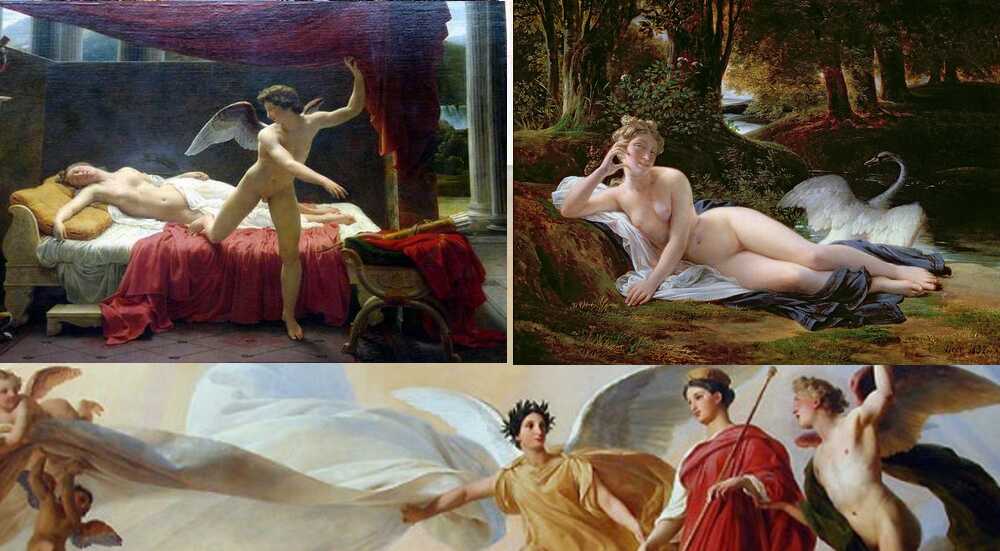
How Was the Religion of the Ancient Greeks?
The Ancient Greeks were polytheistic, worshiping various divinities, especially the twelve Olympic gods (theoi and heroes). Although immortal, the gods had human personality and flaws. They were in fact anthropomorphic and had, like names, weaknesses that often made relationships between gods conflictive with disputes, revenge, love and hatred.
The Greeks did not base their religious feelings on the faith between a god and a mortal, but it depended on the circumstances, the moment and the predilections of the faithful. And these, the gods, interfered in the human world at will and not always with the approval and pleasure of mortals.
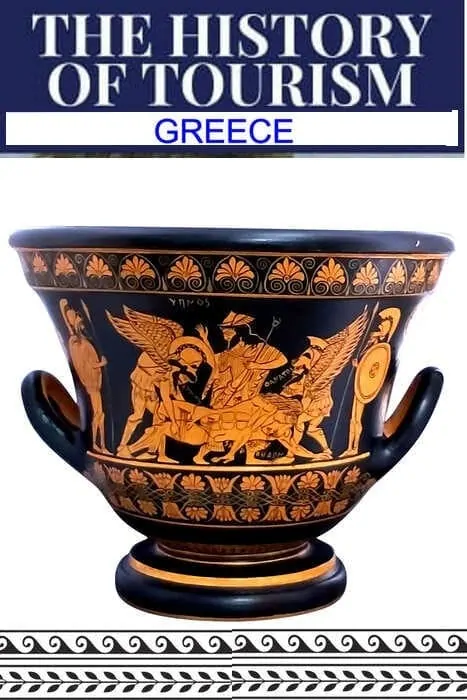
How did the Greek Gods Manifest to Humans?
The gods could manifest themselves to humans in various ways, through dreams, omens, oracles. To understand their messages, the help of priests/priestesses was required.
Oracles were essential and a fundamental aspect of religion and culture in ancient Greece. They went to them to know the future by asking a god.
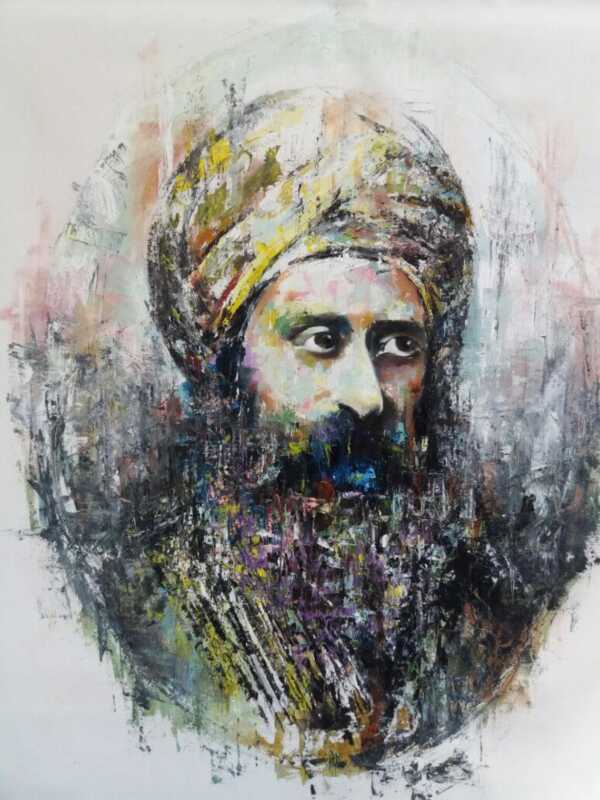
Among all the gods, Apollo at Delphi was the most famous. The answers that the assistants requested came through her priestess, the Pythia, who went into a trance when she was “possessed” by the god Apollo.
Mystery cults were also very important. The most famous took place in the city of Eleusis, dedicated to Demeter (goddess of agriculture) and her daughter Persephone (of the underworld). The most sacred rituals took place in the telesterion or initiation room of the sanctuary and could not be revealed to anyone on pain of death.

Who were the Olympian gods?
The main and best known are the Olympic gods were 12: Religion and Mythology of the Ancient Greeks
- Zeus – God of the sky and thunder, king of the gods.
- Hera – Goddess of marriage and family, wife of Zeus.
- Poseidon – God of the sea, earthquakes and horses.
- Aphrodite – Goddess of love, beauty and sexuality. Aphrodite (Roman equivalent goddess: Venus)
- Hermes – God of travel, thieves, messages, and trade.
- Dionysus – God of wine, parties and theater.
- Hephaestus – God of fire, the forge, and crafts.
- Demeter – Goddess of agriculture and fertility.
- Ares – God of war.
- Athena – Goddess of wisdom, military strategy, and the arts.
- Apollo – God of the sun, music, poetry and medicine.
- Artemis – Goddess of the hunt, the moon and virginity.
Sandro Botticelli – Birth of Venus – 1485
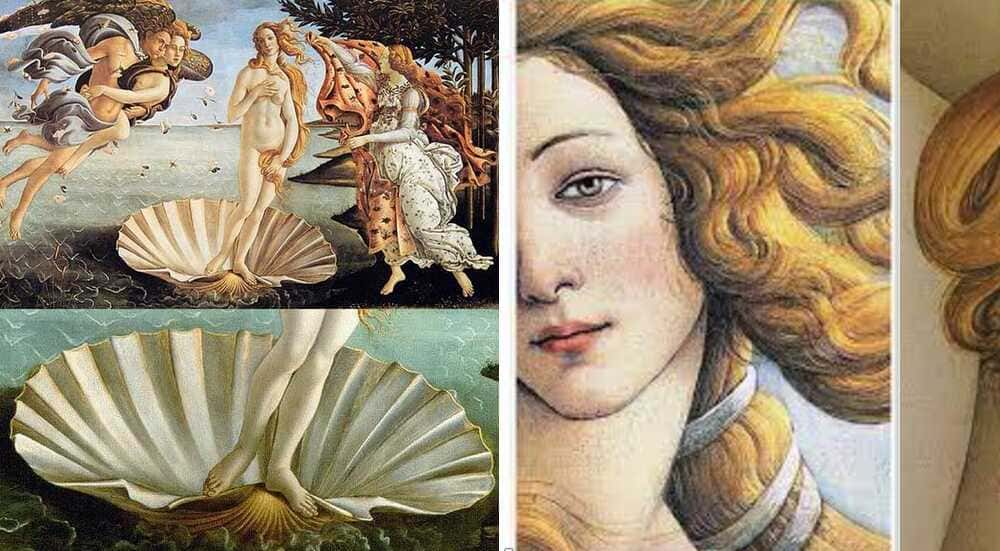
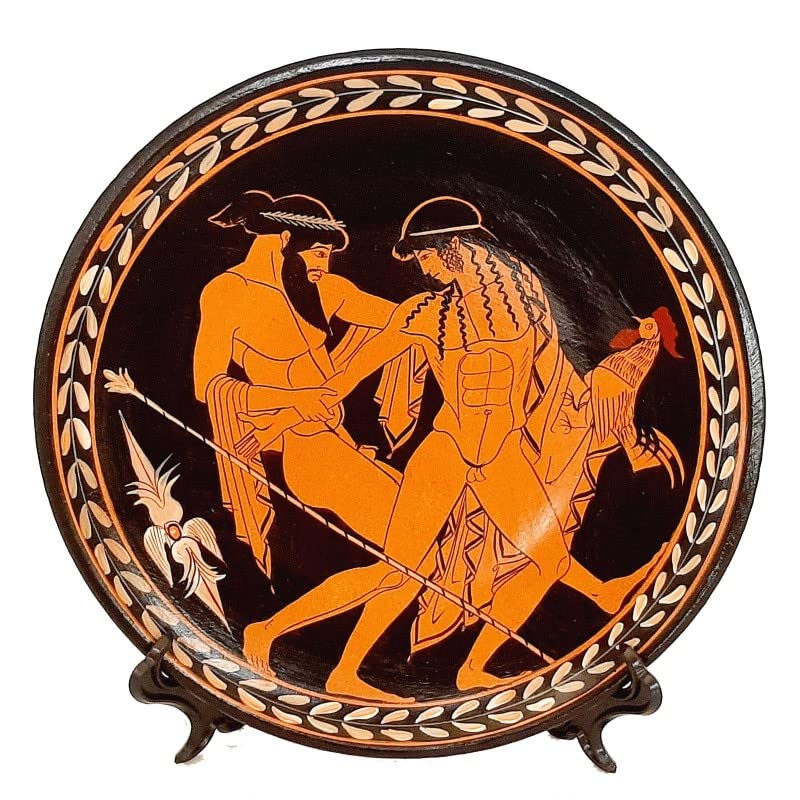
What are the most important Greek myths?
- The Creation of the World: The myth of how the world and the gods were created by Cronos and his sons, including Zeus, Poseidon, and Hades.
- Prometheus and fire: The myth of how Prometheus stole fire from the gods to give it to men, which enraged Zeus and led him to punish Prometheus and mortals.
- The Trojan War: The myth of how the Greeks besieged the city of Troy to recover Helen, the wife of Menelaus, and how the city was finally conquered thanks to the famous Trojan Horse.
- Perseus and Medusa: The myth of how Perseus, helped by the gods, decapitated the fearsome Medusa to save the princess Andromeda and fulfill her destiny.
- Oedipus and the Sphinx: The myth of how Oedipus solved the riddle of the Sphinx to free the city of Thebes from her curse, only to discover that he himself was the murderer of his own father.
- Orpheus and Eurydice: The myth of how Orpheus descended into Hades to try to bring back his beloved Eurydice, but failed in his mission.
- The Kidnapping of Persephone: The myth of how Hades kidnapped Demeter’s daughter, Persephone, and how the harvest goddess managed to get her back, albeit only for part of the year.
- Narciso and Eco: The myth of how Narciso fell in love with his own image reflected in the water, and how Eco, the nymph he loved, was condemned to only be able to repeat the last words of others.
- The Twelve Labors of Hercules: The myth of how Hercules accomplished twelve incredibly difficult tasks, including killing the Nemean lion, cleaning out the Augean stables, and capturing Cerberus, the three-headed dog of the underworld.
- The Rise of Athena: The myth of how Athena, goddess of wisdom and strategy, was born from the head of Zeus, now an adult and armed with a spear and shield, ready to assume her role as one of the main deities of Olympus .
- Pandora’s Box: Pandora’s box hid all the evils. What would the box hide? What she kept was revenge and evil.
- The story of Sisyphus: he was a character punished by Zeus, condemned in the underworld. He had to carry up the hill a huge stone that rolled down every time Sisyphus reached the top. In this way, his task began again and again.
Jacques-Louis David: – 1809 Safo & Faón – 1788 Paris & Helen –
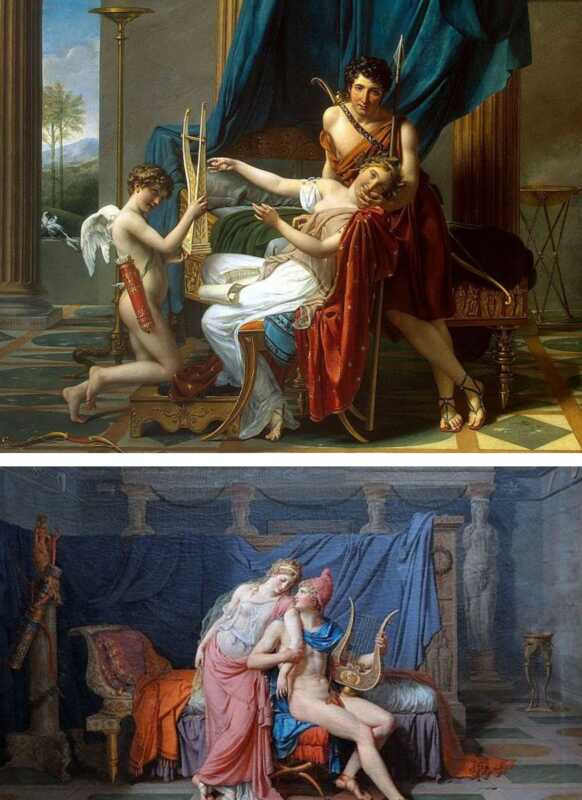
Other Mythologies of the Ancient Greeks
- The legend of Icarus: Icarus, you will be able to fly like birds. You just have to move your arms up and down, but don’t forget this, because it’s very important: don’t go up too high, because the heat of the sun will melt the wax and you will fall into the sea; and don’t fly too low either, because the sea foam will wet the feathers and you won’t be able to fly anymore.
- The myth of Atlas: Zeus sentenced Atlas to hold up the Earth to separate it from the sky for all eternity. To free himself from punishment, he tried to trick Hercules.
- The Myth of Theseus and the Minotaur: A Monster in a Labyrinth that was dark and damp, and one could barely walk through it by feeling the walls.
- The Myth of Pegasus, The Winged Horse; White in color, with enormous wings, capable of flying at great speed, riding through the clouds and making water sprout just by hitting the earth with its hooves.
- Cassandra’s myth: he can see the future, but he can never prevent what has to happen, because no one will ever believe him.
- Apollo and Daphne: the young Apollo was punished by Eros, god of love. Eros took advantage of the fact that Apollo was hunting in the forest. The arrow that Eros stuck in the heart of Apollo made this god fall madly in love with Daphne, while the arrow that stuck in the nymph Daphne, caused that he could only feel revulsion for him
- The goddess Cibeles: she is the daughter of Zeus, who germinated the land of Mount Didymus. She was born a hermaphrodite who was castrated by the gods. The result was Cibeles.
- The myth of Hephaestus: God capable of doing anything with fire. Yes, Hephaestus is the god of fire and the forge. The painter Diego Velázquez immortalized him in his famous Forge of Vulcan (this is how the Romans knew him), Hephaestus agreed to free Hera from the throne in which she remained captive in exchange for the hand of Aphrodite (Roman equivalent goddess: Venus) goddess of beauty.
- The Pygmalion Myth; A king obsessed with perfection. Only he could be capable of shaping what he dreamed of, just as he had been looking for it. Only he could create the woman he wanted
- The myth of the Plauta of Pan: Pan was the god of the forests and the herds. He was also a musician and a god of fertility and male sexuality. He dedicated himself to chasing nymphs and girls. For the Romans, it is a faun. His father is Hermes, the messenger of Zeus, god of Olympus.
.
Raphael’s – School of Athens –
School of Athens is a fresco painted between 1509 and 1511 by the Italian Renaissance artist Raffaello Sanzio da Urbino
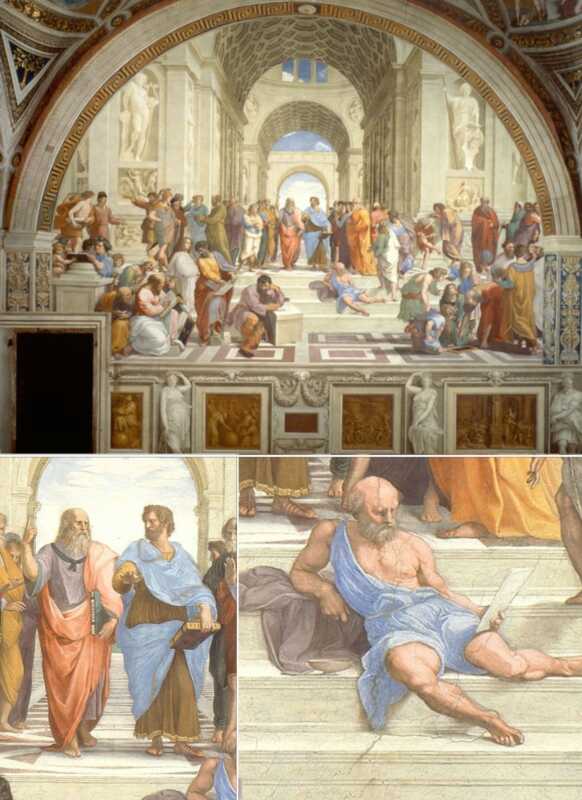
Who were the minor gods of Greek mythology?
- Eris – Goddess of discord. Religion and Mythology of the Ancient Greeks
- Hecate – Goddess of magic, witchcraft and crossroads.
- Chiron – Centaur god of medicine and education.
- Pan – God of the forests, shepherds and flocks.
- Nemesis – Goddess of revenge and divine justice.
- Morpheus – God of dreams.
- Aeolus – God of wind and air.
- Charon – Boatman of the dead who carried souls to the underworld.
- Persephone – Goddess of spring.
- The Fates – The three sisters of fate who spun, measured and cut the thread of life.
- Tique – Goddess of luck and destiny.
- The Muses – Nine goddesses who inspired artists and poets.
- The Graces – Three goddesses of beauty, joy and creativity.
- The Hours – Three goddesses of the seasons of the year and time.
- Iris – Goddess of the rainbow and messenger of the gods.
- Harpies – Female spirits with the body of a bird and the head of a woman, daughters of Thaumante and Electra.
- Gorgons – Three monstrous sisters, Medusa, Esteno and Euríale.
- Minotaur – A creature with the body of a man and the head of a bull, son of Pasiphae and the bull of Poseidon.
- Cyclops – Giants with one eye on their foreheads, sons of Uranus and Gaea.
- Satyrs – Half-man, half-goat beings, followers of Dionysus
The Lament of Icarus, by Herbert Draper, 1898
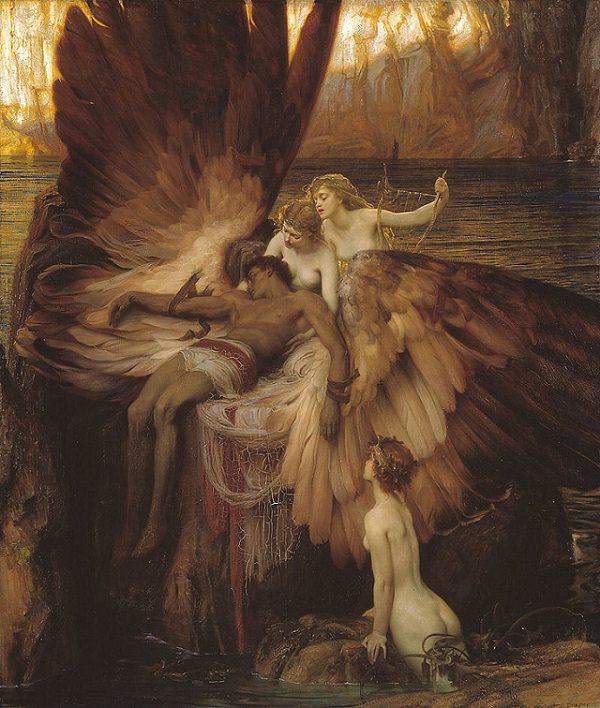
What were the Greek mythological heroes?
- Hercules – Demigod famous for his strength and courage, performed twelve labors to purify his soul.
- Perseus – Demigod who killed Medusa and saved Andromeda.Jason – Hero who led the Argonauts in their search for the Golden Fleece.
- Odysseus – King of Ithaca and hero of the Trojan War, famous for his cunning and his journey home.
- Atalanta – Swift and skilled hunter, famous for her run in which she was bested by Hippomenes.
Cybele protects from Vesuvius the towns of Pompeii and Herculaneum by Francois-Edouard Pico
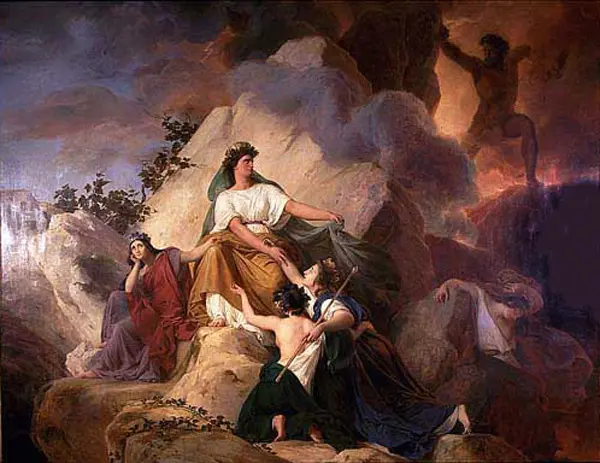
- Hector – Trojan prince and brave warrior who died in the Trojan War.
- Theseus – Athenian hero who killed the Minotaur in the labyrinth of Crete.
- Achilles – Invulnerable warrior except at his heel, protagonist of the Trojan War.
- Orpheus – Musician and poet who descended into Hades to bring back his beloved Eurydice.
- Bellerophon – Hero who tamed the winged horse Pegasus and slew the fearsome Chimera.
Echo and Narcissus, by John William Waterhouse, 1903
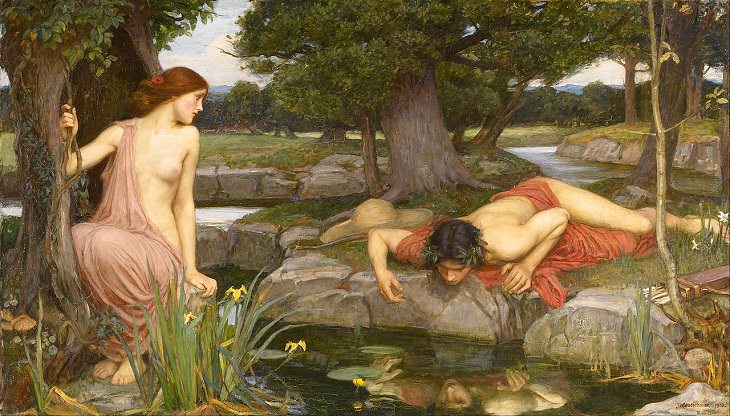
What are ancient books that narrate Greek mythology?
- Greek mythology has been chronicled in numerous books throughout history, from ancient Greek epics and tragedies to modern works of fiction and nonfiction.
- The Iliad and The Odyssey of Homer: They are two ancient Greek epics that narrate the events of the Trojan War and the adventures of Odysseus on his return home.
- Ovid’s Metamorphoses: A Roman epic poem recounting numerous Greek myths, from the creation of the world to the ascension of Julius Caesar.
- Hesiod’s Theogony: A poem describing the origin and genealogy of the Greek gods, as well as the struggle between the divine generations.
- Hesiod’s Works and Days: This is another poem by Hesiod that describes the daily life of a Greek peasant and offers practical and mythological advice. It usually appears together with Theogony.
- The tragedies of Aeschylus, Sophocles and Euripides: The great Greek dramas that tell the stories of heroes and gods, including “Oedipus Rex”, “Antigone” and “The Bacchae”.
- The Library of Apollodorus: Ancient compendium of Greek myths, describing the stories of the gods, heroes and monsters.
Greek pantheon: Table of equivalences between Greek and Roman gods
|
To take into account on a trip to Greece
TSA Liquid Regulations
TSA rules for Medications
Visit the Acropolis and Parthenon – Tips & Tickets





